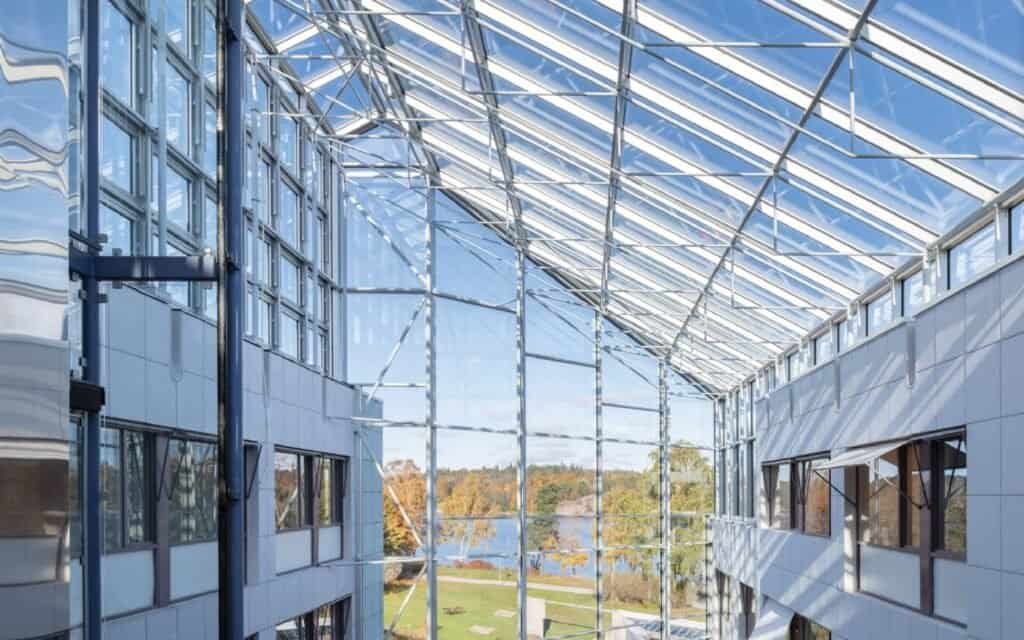Industrial Applications
Innovative polycarbonate solutions are used in industrial applications to provide an ideal combination of strength, durability, and transparency, making them suitable for facilities that require high performance and modern appearance, such as factories, warehouses, and production sites.
Polycarbonate is widely used in industrial applications due to its exceptional strength, impact resistance, and ability to withstand harsh environments. It is commonly used in machine guards, protective panels, and industrial glazing where both safety and visibility are essential. Thanks to its lightweight nature and ease of shaping, polycarbonate enhances operational efficiency and reduces structural load. It also resists chemicals and high temperatures, making it ideal for factories, production facilities, and warehouses that require reliable, long-lasting materials to protect equipment and workers while maintaining clear visibility and safety compliance.
Applications Images

Protective Barriers for Machines
Polycarbonate protective barriers are essential in industrial environments, offering effective protection against potential hazards such as flying debris or moving machine parts. These barriers allow clear visibility of ongoing operations without compromising safety. Polycarbonate provides protection while maintaining transparency, enabling supervisors to closely monitor the processes. The use of protective barriers significantly enhances workplace safety, reducing accidents and injuries among workers. It also helps improve production efficiency by minimizing delays caused by malfunctions or accidents.
Industrial Glazing for Factories
Polycarbonate is an ideal material for industrial glass in environments that require high impact resistance and harsh environmental conditions. These windows are not only strong but also offer high optical clarity, allowing natural light to enter and improving the work environment. Polycarbonate can withstand extreme temperature changes and harsh weather, making it perfect for factories that require durable and safe materials. The use of polycarbonate glass improves the internal work environment, enhancing workers’ productivity and well-being. It also helps reduce energy costs by minimizing the need for artificial lighting and heating.

Control Rooms & Command Centers
Polycarbonate is increasingly used in the design and construction of control rooms and command centers within large industrial facilities—such as petrochemical plants, power generation stations, and process-control hubs for complex production lines. Polycarbonate provides a robust barrier against explosions, sparks, and other potential hazards without compromising visibility or operability. Its resistance to chemicals and high temperatures makes it ideal for use in high-risk environments, cementing its status as a reliable, preferred material for the critical infrastructure that supports modern industrial control systems.

Polycarbonate for Industrial Applications:
- Machine protection with transparent, shatter-resistant covers.
- Industrial glazing for windows and doors in factories.
- Safety barriers on production lines and work zones.
- Roofing panels for industrial buildings and warehouses.
- Transparent soundproofing in noisy work environments.
- Protective shields in hazardous work areas.
- Chemical-resistant in chemical manufacturing plants.
- Used in electrical panels and equipment enclosures.
- Withstands high and low temperatures.
- Lightweight, easy to shape, and low maintenance.
Benefits of Polycarbonate in Industrial Applications:
- Impact Resistance: Stronger than glass, reduces breakage risks.
- Lightweight: Easy to handle and install.
- Temperature Resistance: Withstands extreme temperatures.
- Chemical Resistance: Durable against corrosive substances.
- Transparency: Excellent visibility and natural light.
- UV Protection: Prevents material degradation from sunlight.
- Easy Fabrication: Easily shaped for various applications.
- Weather Resistance: Resists harsh weather conditions.
- Low Maintenance: Requires minimal upkeep.
- Energy Efficiency: Helps reduce heat loss for better energy use.

